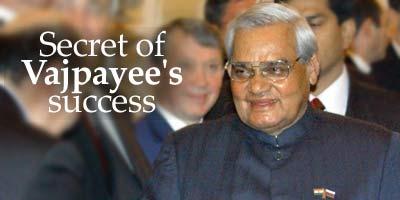
Since 1971, no prime minister had won re-election in India-- until Mr Atal Bihari Vajpayee came along. Forced into an early election in 1999, he improved on his original mandate. And now he seems set to be re-elected to office again.
Though there is doubt about the size of his majority. This is a formidable feat -- especially when his own party has so far not won more than a third of the seats in the Lok Sabha or a fourth of the votes cast. So it is worth trying to figure out why and how.
It could be that he has been blessed with an opponent who is handicapped by her origins and out of her depth, and therefore constantly outmanoeuvred, but that surely cannot be the sole explanation.
It could be that he is simply lucky, in that he is able to cash in on a near-perfect monsoon and face voters with claims on economic performance that he would have been quite unable to make a short 12 months ago.
And it could be that he has a second in command whose public image always comes off second-best in any comparison, so there is no challenge to his leadership of the coalition. It could even be that he is simply the mascot of a cadre-based party with an ideology whose time has come -- the leader who is carried to victory by millions of invisible hands.
But to attribute his success solely to circumstance would be unfair to the man. Surely, he has had a role to play in his own impressive string of victories.
It could be that he is the great accommodator, willing to adjust in ever so many ways so as to make his coalition a lasting and stable one. His personal style is non-confrontational and suited to the role of leading a coalition of un-likeminded parties.
To be able to gain the support and cooperation of leaders ranging from Chandrababu Naidu to Jayalalithaa, from Nitish Kumar to Mamta Banerjee, and from Bal Thackeray to Parkash Singh Badal, speaks of a broad acceptance that must come not out of any special effort to be all things to all men, but to simply be what he is -- the mainstream guy in a party known for edgy positions.
It certainly helps that he is the great orator with an ability to turn out the resonant phrase. Indian elections are still not reduced to sound bites on television.
So a public speaker is at an advantage in a culture of mass contact politics. Compare him on the podium to Advani, Sonia and all the others and it becomes clear that Mr Vajpayee's oratory is a great asset -- and one that, combined with his poet's instincts, help give his politics the humanist hue that fellow-Rashtriya Swayamsevak Sangh stalwarts can never hope for, even if they were to want it.
It could be that his age and general demeanour allow him to rise above the battle, to be the big picture visionary, while the hard skirmishing and the dirty electioneering work are done by younger, hardnosed lieutenants -- so even critics have to concede that he might be the right man in the wrong party, and Sonia Gandhi gives an unintended compliment when she says that the Bharatiya Janata Party has no card to play other than Mr Vajpayee.
Age and an avuncular manner are an irresistible combination in most Indian contexts.
Add to that the fact that he can push economic reforms without being cast as a reformer or someone who looks to the interests of the wealthy; that he can marshall troops on the border without being seen as a warmonger, and then make overtures to Pakistan without seeming to concede anything; that he can be a swayamsevak and yet not a kooky in khaki shorts adopting cock-eyed positions; and through it all to convey sincerity and avoid the impression of a carefully constructed persona -- all this takes great skill or great sincerity.
When you reach a position when you can out-manoeuvre without being seen to be manoeuvering, to make the moves that catch people off guard without being seen to be very calculating -- you're in that zone where three parliamentary election victories in a row seem the natural thing to achieve.






 © 2025
© 2025